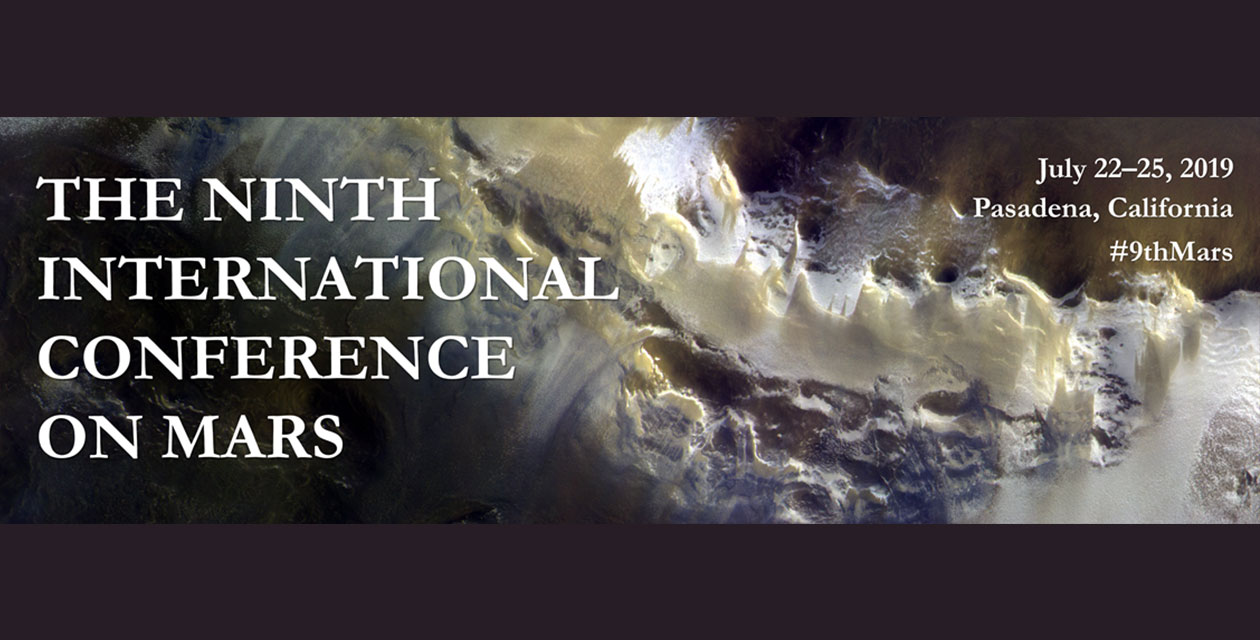The Ninth International Conference on Mars

Tags: Mars, Solar System, Planetary Exploration
Time: 22 - 25 July 2019 -
Location: Pasadena, CA
As of 2019, we will have undertaken two decades of intensive scientific exploration of the Red Planet. With the recent successful landing of the Discovery Program's InSight mission, that period includes two landers (NASA’s 2007 Phoenix and 2018 InSight), three rovers (NASA's 2003 Mars Exploration Rovers Spirit and Opportunity, and 2011 Mars Science Laboratory Curiosity), and six orbiters (NASA’s 2001 Mars Odyssey, ESA's 2003 Mars Express, NASA's 2005 Mars Reconnaissance Orbiter and 2013 Mars Atmosphere and Volatile EvolutioN, ISRO’s 2013 Mars Orbiter, and ESA’s 2016 Trace Gas Orbiter). These Mars vicinity observations are augmented by telescopic observations from Earth, studies of martian meteorites, a variety of numerical and laboratory modeling activities, and extensive studies of Mars analog field sites on Earth. Enormous amounts of data have been returned and are being analyzed by various research and analysis programs, yielding clearer understandings of the present and past Mars’ climate and processes. Meanwhile, additional missions, including NASA's 2020 Mars Rover, ESA's 2020 ExoMars Rover and Surface Platform, and UAE’s 2020 Hope Mars Mission, are working towards launch in the summer of 2020.
The Ninth International Mars Conference will be an ideal time to step back and summarize our current understanding of Mars, so as to highlight the paradigm-changing discoveries and progress on the primary science questions that has been made since the last conference in this series, five years ago. We will also discuss how to build on our scientific understanding and answer the most important outstanding questions by refining the scientific goals to be pursued, including over the decade that will be the subject of the upcoming U.S. Planetary Science Decadal Survey (2023–2032) and a period when several nations will have ongoing Mars mission.
This meeting aims to fulfill three purposes:
- To synthesize changed paradigms in Mars evolution and pull together the breadth of current Mars knowledge;
- Based on current understandings of Mars’ history, state, and processes, to look forward towards the next decades of Mars exploration; and
- From the above, to aid both individual community members’ and larger groups’/institutions’ planning for that next decade
Contributions from Mars scientists in all scientific sub-disciplines are invited, including both specific data-driven abstracts and broader synthesis abstracts. Oral presentations will be selected with a preference for those that integrate between individual science results, placing a current state of understanding within a larger context and addressing the evolution of scientific objectives as motivated by ongoing discovery and scholarship.
Virginia Gulick will be giving a presentation on her Lyot Crater and thermokarst landform work, Gully Formation on the Central Peak of Lyot Crater: Implications for a late Paleo Microclimate.
Janice Bishop will also be giving a presentation on Salty Residues on Mars Mark Changing Geochemical Environments.
All “martians” are welcome to attend.
For more information, visit https://www.hou.usra.edu/meetings/ninthmars2019/
